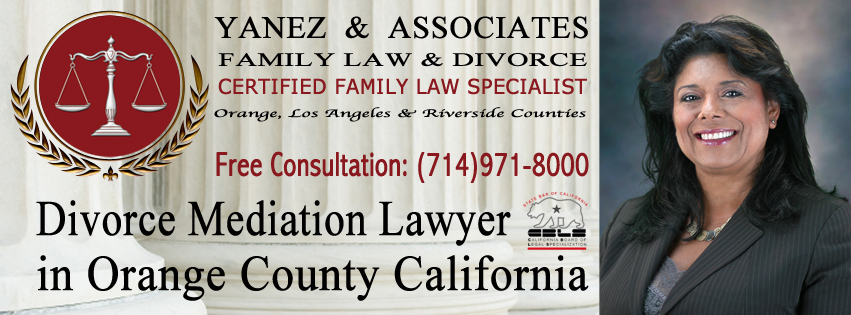Alternative Dispute Resolution: Divorce Mediation Benefits in California
Is there divorce mediation benefits? Every divorce is different. In addition to resolving a divorce through litigation, forms of alternative dispute resolution exist to accommodate those couples who want to work through their divorce outside of the Court.
Mediation is a way to resolve family law issues, such as a divorce or child custody dispute. It involves both parties to the dispute to work through their issues with the help of a neutral, third party mediator. Following mediation, the mediator can write up an agreement, which, if approved by a judge, can become a legal court order.
Divorce Mediation Saves You Money
In California, the average mediated divorce costs about $5,000. If a divorce goes through litigation it could cost $15,000 or more.
Mediation requires one mediator for both parties. The mediator can be an attorney who is trained in mediation, but neither party is allowed to hire an attorney to represent them in mediation. Hiring one attorney instead of two can cut huge cost.
If either party wishes to hire an attorney for advice or preparation for mediation, or to look over the mediation agreement prior to submitting it to a judge, they have that option. However, even hiring separate attorneys is less costly when you only need legal services on occasion rather than throughout a lengthy divorce.
This is one way that mediation can cost less than litigated divorce, during which both parties will likely have an attorney to represent them throughout the duration of the divorce.
Divorce on Your Time
Mediation allows the couple to move at their own pace, and to spend as much or as little time making decisions and moving forward as the couple wants. In this regard, your divorce can take as much time or as little time as you would like.
While court is only in session during business hours, a mediator may be flexible about when you and your spouse can meet. This flexibility is especially important if you need to consult experts during property division or child custody discussions. Mediation may also take place over Skype or conference call if the parties are in different locations. In a litigated divorce, on the other hand, it may take months just to schedule the next court date.
Mediation Allows the Divorcing Couple the Most Control Over the Divorce
The purpose of mediation is to allow a couple to talk through their disagreements and decide how to divide property, choose a child custody and visitation schedule, determine child support, and draft a divorce settlement on their own. Mediation usually starts with a document that states what the couple wants to accomplish through mediation; not every divorce covers the same topics. When you’re crafting your own divorce settlement, you get to decide what it contains.
Rather than hiring an attorney to speak for you, each party to mediation can speak directly and be heard in a safe, private space. Each party has the opportunity to state opinions, participate in negotiations, and have the complete attention of a mediator to guide the couple through the process. On the other hand, in litigated divorces, a judge is often busy with other cases at the same time, and does not spend the time to get to know your family like a mediator will.
A judge will make decisions based on the law, while a mediator will help you to tailor your divorce settlement to the needs of your family.
Your Divorce is Confidential
Any communication, documents, or discussions from divorce mediation are privileged and confidential. You and your spouse or partner will meet with a mediator in private, and when a judge determines whether your mediation agreement will become a court order, it is done privately.
Rather than arguing about your personal life in front of a court and bringing your children into members of your community, the details of your divorce will be confidential.
Protect Your Children
If your divorce involves children, you will likely have to determine a child custody and visitation agreement, as well as a child support agreement.
During a litigated divorce, children are usually interviewed by experts, and they may have to appear in court during trial. This can lead to stressed relationships within the family, and may make the divorce harder on the children.
In order for a child custody order to be approved by a judge, it must be made in the best interest of the child.
A mediated divorce allows the family to keep the personal matters private. If mediation is successful, children will not have to appear in court. The mediator, who will get to know the family throughout the process, can keep the focus on the children, and help the parents create a customized and appropriate child custody and visitation order.
Pave the Way for Post Divorce Co-Parenting and Happiness
Beginning the divorce process can be stressful on any couple. Working through their issues in mediation opens up the lines of communication, and allows the parties to set their own divorce settlement. Because both parties have a say in the outcome of their divorce, they are more likely to not only understand the terms of the settlement, but to follow them.
The communication skills learned in mediation can also set the standard for the future of the relationship between the parties, whether children are involved or not. If there are children, or if spousal support is a part of the divorce settlement, the parties will be in one another’s lives in the future, and their communication skills can make or break their future relationship.
If there are issues in the future, the family can return to the same mediator, who already understands the family dynamic, to work through those issues.
Divorce Mediation Lawyer in the OC
If you’re considering either a litigated divorce or divorce mediation, discuss your options with an Orange County family law attorney. At Yanez& Associates, your free initial consultation allows you an opportunity to discuss your needs with an attorney. Contact us today to discuss how our mediators can help your family through a divorce.

















